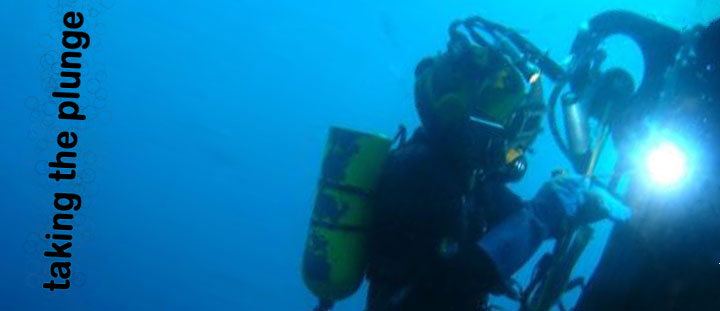
Educ. Home Page
A Guide to Starting an Underwater Welding Career
A Special Report from the American Welding Society
CryoGas International examines the many ways the industrial gas industry works with water. The demand for highly sophisticated underwater procedures and technologies is increasing, driven by deep sea oil and gas development and by marine infrastructure development and repair around the world. In this article the American Welding Society (AWS) looks at careers in underwater welding.
For prospective underwater welder-divers, the American Welding Society Subcommittee on Underwater Welding provides answers for nine commonly asked questions in "Taking the Plunge: A Guide to Starting an Underwater Welding Career," (copyright ©AWS). This article summarizes that report.
This article was prepared by the American Welding Society's D3B Subcommittee on Underwater Welding.
- What skills are prerequisite to entering the field of underwater welding?
- A welder-diver is a certified welder and commercial diver, capable of performing tasks associated with commercial sub sea work, weld set up and preparation, and who has the ability to weld in accordance with the AWS D3.6M, Underwater Welding Code, wet or dry, and perform other weld-related activities.
- I am a certified surface welder; what other training do I need to qualify as a welder-diver?
- The majority of work performed by an average welder-diver
involves executing the tasks that lead up to and follow the actual welding activities.
In most cases, a welder-diver must possess both certified welder skills and commercial
diving skills.
If a welder has no prior commercial diving experience, attending a recognized commercial diving school is required. Expect to begin your career as a diver tender (apprentice diver). The average time that this phase takes for most candidates is two years. Most diving contractors will require that you achieve sufficient skill in wet and/or dry underwater welding to pass qualification tests and be certified in accordance with the requirements of AWS D3.6M, Underwater Welding Code. - I am already a certified diver; what other training do I need to qualify as a welder-diver?
- We recommend the specifications described in AWS D3.6M
as a reference for weld procedure and welder qualification. If you are already certified as a
"commercial diver," contact companies that offer underwater welding services and train to their requirements.
Underwater welding is a skill you have to master once you obtain the basic commercial diving skills.
If you are certified as a "scuba diver" (e.g., NAUI, PADI, etc.), please note that sport dive training does not include the safe use of commercial diving equipment, offshore commercial work environment/safety, and other education as recommended by the Association of Diving Contractors Consensus Standards for Commercial Diving Operations. - Where can I obtain the further training I need to get started in this field?
- AWS provides a list of underwater welding schools with their websites and contact information on its website at www.aws.org/w/a/education/underwater.html.
- What are the age limitations of a welder-diver?
- There is no age restriction on commercial welder-divers, but it is recommended and generally required that all commercial divers pass an annual dive physical.
- What is the availability of work for an entry-level welder-diver?
- There are a number of diving procedures that serve the various types of underwater industrial requirements, each of which have different underwater welding needs. Like many professions, work availability is subject to supply and demand, the economics of a given industry, whether you are free to relocate outside your place of residence (including overseas), what other related skills you have in addition to diving and welding, etc.
- What salary can I expect to make as a welder-diver?
- Salaries for welder-divers cover a wide range, from $100,000 to $200,000 per year. The majority of welder-divers are paid on a project-by-project basis and salaries are subject to the same variables as work availability. In addition, other factors such as depth, dive method, and diving environment affect pay rates.
- What other skills are recommended to supplement my qualifications as a welder-diver?
- Welder-diver qualifications vary from project to project. Possessing the skills that are common to underwater welding operations, in addition to welding and diving, are recommended. These skills include: underwater cutting; fitting and rigging; inspection and nondestructive testing; drafting; and underwater photography. The most desirable underwater welder-divers are qualified to assist the diving contractor in pre-job planning; be able to cut, clean, rig, install, and fit up the sections they will weld; and work with personnel responsible for inspecting the completed welds. Formal training is recommended and maintaining qualifications is important.
- What future career opportunities are there for an experienced welder-diver?
- There are a number of career opportunities for experienced welder-divers. Industry has and will continue to demand higher quality standards for underwater welds and more certification of underwater welding systems and personnel. These demands will challenge the underwater welding community to meet more complex technical specifications, safety standards, welding criteria, inspection methods, environmental factors, and other considerations. Many welder-divers go on to become engineers, instructors, and diving operation supervisors, and superintendents fill management positions, qualify as AWS Certified Welding Inspectors (CWI), and serve as consultants for underwater welding operations and other related fields.
Please note: the answers to the questions presented in the article are not intended as recommended practice or as endorsement of any definitive means of pursuing underwater welding as an occupation.
For more information on careers in welding, or to learn more about the new D3.6M:2010, Underwater Welding Code, visit the AWS website at www.aws.org or call 305-443-9353.
© 2011 American Welding Society
550 LeJeune Rd., Miami, Florida, USA 33126
Tel. 305-443-9353 • Fax 305-648-1655
www.aws.org
e-mail: nbradley@aws.org